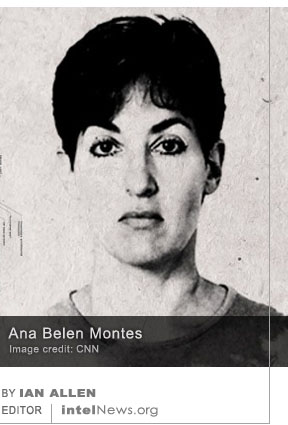The Miami Herald
Infiltration, seduction among Cuban spy tactics in U.S.
BY TIM JOHNSON
WASHINGTON - Ana Belen Montes' confession in March brought the latest evidence of how Fidel Castro's regime seeks to spy on the United States,
targeting the Cuban exile community, Capitol Hill, the military and CIA, and universities, experts say.
Time after time, Cuba's Directorate of Intelligence has run double agents, letting them fall into U.S. hands, or wash up on U.S. shores, as presumed
defectors.
After insinuating themselves into exile groups, Radio Martí or federal agencies, they would sow discord, or bolt back to Havana to publicly discredit the
U.S. government.
Cuban spies based in the United States are ''very smooth, very acculturated and really very, very professional,'' one retired counterintelligence official
said.
They operate from the Cuban Interests Section in Washington and the huge Cuban mission to the United Nations in New York City, which has more than
70 accredited diplomats.
''I'll just flatly tell you that almost every one of them are intelligence officers,'' the retired official said.
At Cuba's mission in New York City, intelligence gathering is such a principal task, another U.S. official said, that many of the Cuban personnel ``frankly
don't even know where the U.N. is.''
By the mid-1970s, Cuban operatives were gathering information not only for Havana but also to pass on to the Soviet spy agency, the KGB.
''The Cubans were much more successful at bringing people aboard and gathering information,'' the official said. ``They were Latin and they were kind of
glamorous. We're much more open to Latins than we are to people with steel teeth and a Slavic accent.''
Cuban intelligence agents practice literal and figurative seduction, spending months and even years looking for weak points in their targets, experts say.
''They investigate everything,'' said Francisco Avila, a former Cuban double agent who came clean in 1992 and now lives in South Florida. ``Do you like to
smoke? Do you like to fish, hunt? Go to the movies? Or maybe a man is a real womanizer, and they send a woman to seduce him.''
Avila, who was tasked by Cuban intelligence with infiltrating Alpha 66, a Miami exile paramilitary group, voiced amazement at how many Cuban agents
penetrated the group.
''One time, I was one of six people aboard a boat belonging to Alpha 66, and I looked around and realized that three of us were from [Cuban] state
security,'' Avila said.
Before his break with Havana, Avila said, he would receive instructions in Miami every three months or from a contact, who would give him a large
hollowed-out bolt with a paper inside.
The paper would instruct him on how to meet his Cuban intelligence handler in New York City.
'It would say something like, `We'll see each other in Queens at such and such an hour in front of a Kentucky Fried Chicken,' '' Avila said. When Avila
would show up there, ''almost always it was the first secretary of the U.N. Interests Section'' waiting for him.
The FBI counterintelligence unit has about 40 to 50 agents nationwide assigned to watch Cuban spies -- not nearly enough to keep tabs on every Cuban
diplomat who wanders the streets of New York, Washington and Miami.
''It's not like the movies,'' the security official said.
``You put two people out on somebody and they'll lose him. It's very hard to surveil somebody.''

 AGENTS OF THE CUBAN government have “penetrated virtually every segment of the United States national security structure,” enabling Havana to share actionable intelligence with Russia and China, according to a new report. Citing former United States and Cuban intelligence officers, The Wall Street Journal
AGENTS OF THE CUBAN government have “penetrated virtually every segment of the United States national security structure,” enabling Havana to share actionable intelligence with Russia and China, according to a new report. Citing former United States and Cuban intelligence officers, The Wall Street Journal
Comments